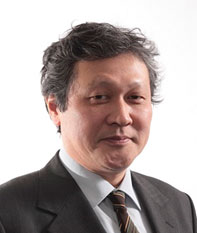
Professor, Department of Electrical Engineering and Information Systems
The University of Tokyo, Japan
Akira Hirose received the Ph.D. degree in electronic engineering from the University of Tokyo in 1991. In 1987, he joined Research Center for Advanced Science and Technology (RCAST), the University of Tokyo, as Research Associate. In 1991, he was appointed as Instructor at RCAST. From 1993 to 1995, on leave of absence from the University of Tokyo, he joined the Institute for Neuroinformatics, University of Bonn, Bonn, Germany. He is currently Professor with the Department of Electrical Engineering and Information Systems, the University of Tokyo. The main fields of his research interests are wireless electronics and neural networks. In the fields, he published several books such as Complex-Valued Neural Networks, 2nd Edition (Springer 2012). He served as the Founding President of Asia-Pacific Neural Network Society (APNNS) (2016), President of Japanese Neural Network Society (JNNS) (2013-2015), Vice President of the IEICE Electronics Society (ES) (2013-2015), Editor-in-Chief of the IEICE Transactions on Electronics (2011-2012), Associate Editor of journals such as the IEEE TRANSACTIONS ON NEURAL NETWORKS (2009-2011), IEEE GEOSCIENCE AND REMOTE SENSING NEWSLETTER (2009-2012), Chair of the Neurocomputing Technical Group in the IEICE, Founding Chair of the IEEE CIS NNTC Complex-Valued Neural Network Task Force (2010-), Governing Board Member of APNNA/APNNS (2006-), IEEE Geoscience and Remote Sensing Society (GRSS) All Japan Chapter Chair (2013-2015) and IEEE Computational Intelligence Society (CIS) All Japan Chapter Chair (2017- 2018). He also served as the General Chair of Asia-Pacific Conference on Synthetic Aperture Radar (APSAR) 2013 Tsukuba, International Conference on Neural Information Processing (ICONIP) 2016 Kyoto, and International Geoscience and Remote Sensing Symposium (IGARSS) 2019 Yokohama. Dr. Hirose is a Fellow of the IEEE and the IEICE, and a member of JNNS and APNNS.
Title:Reservoir computing: A framework to bring new interaction paradigm between neural dynamics and hardware
Summary:Reservoir computing (RC) attracts many researchers in these years because of its fast and robust learning in time-series signal processing. In addition, physical RC is promising in the sensor-network society for its low-power operation at network-end nodes to deal with real-time physical and social data in the near future. It will also open a new paradigm of interaction between neural dynamics and hardware. There are various candidates among wide physical phenomena for use in physical RC. In this presentation, we pick up some topics in the recent physical RC with focus on optical and spin-wave reservoir computing. We also discuss their future development towards practical implementation and applications.
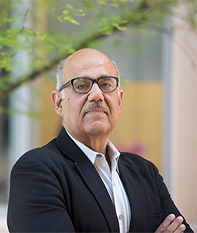
Professor of Computer Science and Oden Institute of Computational Engineering and Sciences
The University of Texas at Austin, USA
Prof. Bajaj’s current research is on the computer science and computational mathematics foundations of statistical and dynamic decision making, learning dynamical systems and exploratory visualization. He develops machine learning and geometric optimization algorithms for applications in the physical, chemical, health and environmental data sciences, medicine and neuro-morphic computing. Prof. Bajaj revisits his past research in modeling multi-scale form and function, through the lens of inferential data sciences. Prof. Bajaj’s current research projects include (a) forward and inverse optimization problems in microscopy, spectroscopy, electro-magnetic and electro-optical wide spectrum imaging; (b) generative shape and new material design for spatially realistic and phenomenological models; (c) learning from nature and generating models and mechanisms with accelerated and emergent properties. He also teaches an undergraduate course titled “Geometric Foundations of Data Sciences” and a graduate course titled “Predictive Machine Learning”. Prof. Bajaj has courtesy appointments and supervise undergraduates, M.S. and Ph.D. students from several UT departments, including biomedical and electrical engineering, neuroscience, and mathematics.
The following is a link to his most cited publications:
https://scholar.google.com/citations?user=gyL3CZ0AAAAJ%22&user=gyL3CZ0AAAAJ
Title: Learning Optimal Control with Stochastic Models of Hamiltonian Dynamics
Summary: Optimal control problems can be solved by applying the Pontryagin maximum principle and then solving for a Hamiltonian dynamical system.
In this talk we learn the reduced Hamiltonian of the controlled Hamiltonian obtained by applying the Pontryagin maximum principle to the original optimal control problem. The reduced Hamiltonian network can be learned by going backward in time and then minimizing loss function deduced from the Pontryagin maximum principle's conditions. This framework applies to not only optimal control problems with finite-dimensional states but also the ones with infinite-dimensional states. Moreover, the learning process can be improved by progressively learning a posterior distribution of reduced Hamiltonians, and that can lead to more efficient samplings of the generalized coordinates for network training. This is joint work with Minh Nguyen.
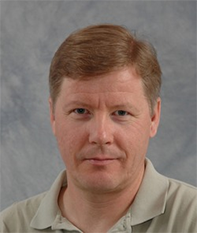
Professor of Computer Science
The University of Texas at Austin, USA
Associate VP for Evolutionary AI, Cognizant AI Labs
Prof. Risto Miikkulainen is a Professor of Computer Science at the University of Texas at Austin and AVP of Evolutionary Intelligence at Cognizant AI Labs. He received an M.S. in Engineering from the Helsinki University of Technology (now Aalto University) in 1986, and a Ph.D. in Computer Science from UCLA in 1990.
Prof. Risto’s research focuses on biologically-inspired computation such as neural networks and evolutionary computation. On one hand, the goal is to understand biological information processing, and on the other, to develop intelligent artificial systems that learn and adapt by observing and interacting with the environment. The three main focus areas are: (1) Neuroevolution, i.e. evolving complex deep learning architectures and recurrent neural networks for sequential decision tasks such as those in robotics, games, and artificial life; (2) Cognitive Science, i.e. models of natural language processing, memory, and learning that, in particular, shed light on disorders such as schizophrenia and aphasia; and (3) Computational Neuroscience, i.e. development, structure, and function of the visual cortex, episodic memory, and language processing. He is an author of over 450 articles in these research areas.
Title: Neuroevolution: A Synergy of Evolution and Learning
Summary: Neural network weights and topologies were originally evolved in order to solve tasks where gradients are not available. Recently, it has also become a useful technique for metalearning architectures of deep learning networks. However, neuroevolution is most powerful when it utilizies synergies of evolution and learning. In this talk I review several examples of such synergies: evolving loss functions, activation functions, surrogate optimization, and human-designed solutions. I will demonstrate these synergies in image recognition, game playing, and pandemic policy optimization, and point out opportunities for future work.

Global Head, NVIDIA AI Technology Centre, Singapore
Prof. Simon See is the Global Head, NVIDIA AI Technology Centre, Singapore. He is also a renowned Professor and Chief Scientific Computing Officer in Shanghai Jiao Tong University. Prof. Simon See is also the Adjunct Professor of the Department of Computer Science & Engineering, Mahindra University. He is currently involved in a number of smart city projects, especially in Singapore and China. His research interests are in the area of High Performance Computing, Big Data, Artificial Intelligence, machine learning, computational science, Applied Mathematics and simulation methodology. Prof. See is also leading some of the AI initiatives in Asia Pacific.
He has published over 200 papers in these areas and has won numerous awards in the field. Prof. See is also a member of SIAM, IEEE and IET. He is also a committee member of more than 50 conferences.
Prof. See graduated from University of Salford (UK) with a PhD in electrical engineering and numerical analysis in 1993. Prior to joining NVIDIA, Dr. See worked for SGI, DSO National Laboratory of Singapore, IBM, International Simulation Ltd (UK), Sun Microsystems and Oracle. He is also providing consultancy to a number of national research and supercomputing centres.
Title: Ways to Scale Numerical Methods for High Fidelity Simulation by 10^6
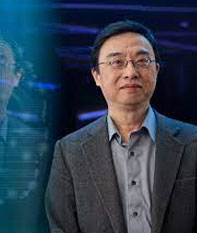
Distinguished Professor of Computer Science
Co-Director, Australian Artificial Intelligence Institute (AAII)
Director, Computational Intelligence and Brain Computer Interface Lab
University of Technology Sydney, Australia
Chin‐Teng Lin received the B.S. degree from the National Chiao-Tung University (NCTU), Taiwan in 1986, and the Master and Ph.D. degree in electrical engineering from Purdue University, West Lafayette, Indiana, U.S.A. in 1989 and 1992, respectively. He is currently a Distinguished Professor, Co-Director of Australian AI Institute, and Director of CIBCI Lab, FEIT, UTS. He is also invited as the International Faculty of the University of California at San Diego (UCSD) from 2012 and Honorary Professorship of University of Nottingham from 2014.
Prof. Lin’s research focuses on machine-intelligent systems and brain computer interface, including algorithm development and system design. He has published over 390 journal papers (H-Index 78 based on Google Scholar), and is the co-author of Neural Fuzzy Systems (Prentice-Hall) and author of Neural Fuzzy Control Systems with Structure and Parameter Learning (World Scientific). Dr. Lin served as Editorin-Chief of IEEE Transactions on Fuzzy Systems from 2011 to 2016, and has served on the Board of Governors of IEEE Circuits and Systems Society, IEEE Systems, Man, and Cybernetics Society, and IEEE Computational Intelligence Society. Dr. Lin is an IEEE Fellow, and received the IEEE Fuzzy Pioneer Award in 2017
Title: AI‐Human Teaming via Brain Computer Interfacing
Summary: Human Machine Autonomous Systems (HMAS) are increasingly gaining attention. This is because future human-centric intelligent systems, such as autonomous vehicles will be able to make better decisions and perform tasks more accurately by exploiting both humans and machines. Employing machine agents to assist human operations in time-critical and mission-critical applications such as industry, manufacturing, agriculture, transportation and health is important and efficient. Nevertheless, reliable operations and interventions by humans are required to improve overall system performance. The physical and cultural evolution of humans and the corresponding development of computing technologies have resulted in the respective ability of humans and machines to subjectively and objectively judge situations and make decisions in dynamic and uncertain environments. Because of the different characteristics of humans and machines, there is a need for a general approach to analyse and fuse information from these distinct agents to assist HMAS in making collaborative decisions under various uncertainties and levels of mutual trust between human and machine agents. This talk will address an intelligent engine to adaptively fuse multiple trusts-based information from various agents in HMAS and introduce a general framework to facilitate human-machine interaction and enable better collaborative decisions in HMAS. A key component of this framework is the brain computer interface (BCI). BCI is widely considered a ‘disruptive technology’ for the next-generation humanmachine interface. BCI can help the machine to understand the cognitive states of the human such as action planning, intention, preference, perception, attention, situational awareness, and decision-making. This talk will also introduce the fundamental physiological changes of human cognitive functions in the interaction with autonomous machines and explain how to combine the bio-findings and AI techniques to develop monitoring and feedback systems to enhance the cooperation of human and autonomy.

Head of Translational Research, Applied Artificial Intelligence Institute
Deakin University, Australia
Rajesh is an innovator and entrepreneur with over two decades of experience spanning both industry and academia with a specialisation in building AI infused systems. He currently leads a multi-disciplinary team focused on translational research at the Applied Artificial Intelligence Institute (A2I2) at Deakin University, Australia. He has a strong record as a research leader with competitive grants and commercial applied grants evidenced by 5 year research income over USD $10M (2016 - 2021); the research work spans - building intelligent homes, assessing clinical risk from medical data streams, improving patient care in hospitals, analysis of data from complex simulations, conversational agents to work in educational settings, and analysing data streams to improve productivity in various settings. Recent innovations (2017-2021) from this lab resulted in spinouts of 4 companies. His research results are published in the highest ranked conferences and journals in the field of software engineering.
Title: Robustness in AI – A software engineering perspective
Summary: AI (Artificial Intelligence) is being touted as the answer for many problems, in different contexts. Currently, commercial AI projects often start with a natural curiosity, leading to experimentation and exploration. Occasionally we see infusion of AI into real-world workflows followed by cautious adoption. Recurring observation is the struggle (of AI projects) to move beyond proof-of-concepts, and they do not deliver to the expectations. AI is a unique technology that delivers real value only when introduced thoughtfully – much more so than any other form of traditional technology. The deep reliance on data presents multiple challenges spanning data acquisition, ethics of using data and probabilistic systems, as well as complex reliability and robustness. This talk will present an overview of the promise as well as the challenges to better inform choices around use of AI technologies. By talking a counter point of “limits of AI and importance of robustness in technology” – I will talk present both the potential and boundaries allowing for a more grounded perspective that is important for educators, researchers and to ensure we can better inform the adoption of this technology. I will talk about progress from our recent investigations in the field of software engineering for AI (SE4AI) that can offer pathways to increase the adoption of AI in commercial contexts.
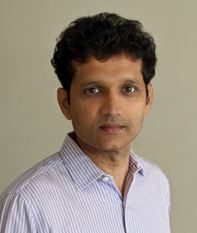
Principal Scientist, TCS Research
Tata Consultancy Services, India
Prof. Naveen is currently a Principal Scientist at TCS Research, India. Naveen did his PhD in Computer Science (algorithms) from Max-Planck Institute for Informatics, Saarbruecken, Germany. He has worked in various industries, including startup and industrial R&D labs. He has also served in academia for over five years as an assistant professor in the Dept. of Computer Science and Engineering, IIT Hyderabad, where he was involved in research, teaching and PhD guidance.
Naveen's research interests are broadly in the areas of applied algorithms, bioinformatics, scalable implementations, machine learning, deep learning and graphs. At TCS Research, he works predominantly in computational biology, especially in the areas of genomics, genome-scale computing, pangenome analysis, computational models for multimodal and multi-omics data, biomedical network analysis and biomedical text mining.
Title: Recent Challenges in Biological Data Analysis with Applications to Personalized Treatment.
